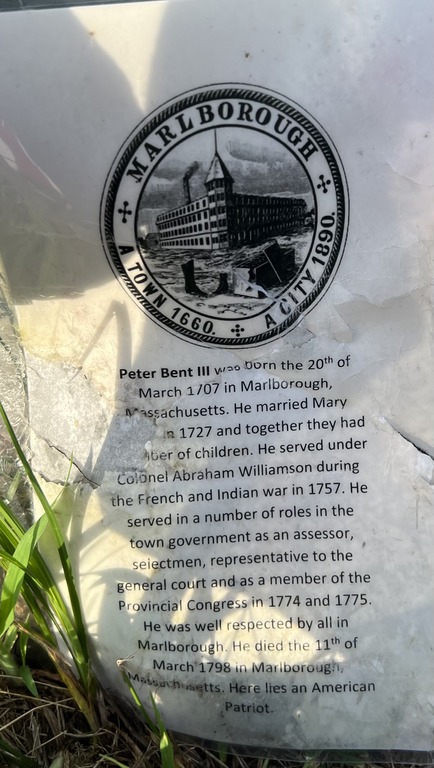Peter BENT III
SAR Patriot #:
P-113577
The following information was assembled from numerous sources and cannot be used directly as proof of Qualifying Service or Lineage.
It is considered a research aid and is intended to assist in locating sources that can be used as proof.
State of Service: MA
Qualifying Service: Civil Service / Patriotic Service
DAR #: A009413
Birth: 20 Mar 1707 Marlborough / Middlesex / MA
Death: 11 Mar 1798 Marlborough / Middlesex / MA
Qualifying Service Description:
- SELECTMAN
- ASSESSOR
- REPRESENTATIVE TO THE GENERAL COURT
Additional References:
MADAR, TOWN OFFICIALS 1775-1783, GRC 1947, S1 VOL 258, pg 1,3
Spouse: Mary Temple
Children: Mary; Anne; Abigail; Patience; Peter; Sarah; Jabez; Deborah;
Members Who Share This Ancestor
| Date Approved | Society | ACN | SAR Member Info | Lineage via Child | View Application Detail | |
|---|---|---|---|---|---|---|
| 2010-05-25 | FL | 38862 | David Judson Bahn (172481) | Patience |
Burial:
Location:
Marlborough / Middlesex / MA / USA
Find A Grave Cemetery #:
Marker Type:
Large Headstone
SAR Grave Dedication Date:
Comments:
Photos used with permission of Compatriot Mitchell Anderson, 229001, KYSSAR
Directions to Cemetery / Gravesite:
Cemetery is located behind the Marlborough Public Library

